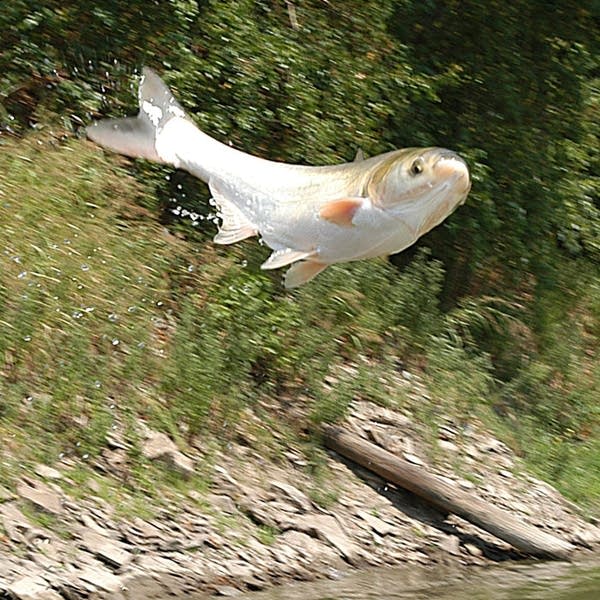5 Great Lakes states sue feds over Asian carp
Go Deeper.
Create an account or log in to save stories.
Like this?
Thanks for liking this story! We have added it to a list of your favorite stories.

Despite being rebuffed twice by the U.S. Supreme Court, five states filed suit Monday with a lower federal court demanding tougher federal and municipal action to prevent Asian carp from overrunning the Great Lakes and decimating their fishing industry.
Michigan, Wisconsin, Ohio, Minnesota and Pennsylvania said in their complaint the situation had become more dire since a live bighead carp was found last month in a Chicago-area waterway only 6 miles from Lake Michigan - well past an electric barrier designed to block the voracious fish's path.
Minnesota Attorney General Lori Swanson says the concern over invading carp is growing.
"We've seen how destructive Asian carp have been in every body of water that they've invaded," she said. "Let's keep them out of the Great Lakes, and make sure that they don't invade what is a very important resource -- not just to our economy but also to our environment in this country."
Turn Up Your Support
MPR News helps you turn down the noise and build shared understanding. Turn up your support for this public resource and keep trusted journalism accessible to all.
The suit was filed in U.S. District Court in northern Illinois. It accuses the U.S. Army Corps of Engineers and the Metropolitan Water Reclamation District of Greater Chicago of creating a public nuisance by operating locks, gates and other infrastructure through which the carp could enter the lakes.
That argument didn't convince the nation's highest court to order the locks closed earlier this year despite two requests from Michigan and other states. But the justices' rulings were procedural and did not deal with the merits of the case, said a spokeswoman for Michigan's attorney general.
The discovery of a 20-pound carp in Lake Calumet on Chicago's South Side might make a federal judge more inclined to rule favorably, said Nick Schroeck, executive director of the Great Lakes Environmental Law Center at Wayne State University.
Previously, the states based their request largely on DNA evidence that critics dismissed as unreliable.
"It's easier to make the case that there's a public nuisance when you have this actual, live fish," Schroeck said.
Officials with the Metropolitan Water Reclamation District of Greater Chicago declined to comment on the lawsuit, saying they had not yet reviewed it. And the U.S. Army Corps of Engineers also declined to comment.
Bighead and silver carp, both Asian varieties, were imported to Deep South fish farms and sewage lagoons in the early 1970s. They escaped into the Mississippi and have been migrating north since.
Prolific and aggressive, carp gobble plankton that form a crucial link in the aquatic food chain. Scientists say if they gain a foothold in the Great Lakes, they could starve out smaller fish that are prey for sport and commercial species such as salmon, walleye and whitefish.
Silver carp also pose a safety hazard with their habit of hurtling from the water at the sound of passing motors. They have collided with boaters.
The carp have infested portions of the Mississippi and Illinois rivers and have been found in waterways near Chicago, where two electronic barriers were installed to block invasive species and a third is under construction. The fear is some carp have gotten past the barriers and may soon invade Lake Michigan, and others will follow.
Some environmental groups are also calling for a separation of the Mississippi and Great Lakes systems. Dave Zentner, past president of the Izaac Walton League, says the system in place to monitor and control invading pests like carp just doesn't work.
"Our regulatory system is so broken, so scattered among various state and federal entities," said Zentner. "Three decades have gone by since the Asian carp have first escaped, and here we are in a situation where we're pitting winners against losers, potentially, rather than taking care of the thing decades ago."
The Army Corps has refused to close shipping locks and gates on the waterways, saying there's no guarantee that doing so would keep the carp out of the lake. Industries that rely on shipping say closing the locks would injure the regional economy.
The Obama administration outlined a $78.5 million anti-carp strategy in February that focused on technological solutions such as strengthening the electric barrier and applying fish poisons where Asian carp DNA was found.
In their lawsuit, the states say those measures aren't enough. Along with closing the locks, they call for more aggressive poisoning, placing nets and other barriers at crucial points and physically separating the Great Lakes and Mississippi River watersheds.
The Corps has promised to study severing the two water systems, but the suit requests an accelerated timetable, including a final planning report within 18 months.
(Copyright 2010 by The Associated Press. All Rights Reserved.)




